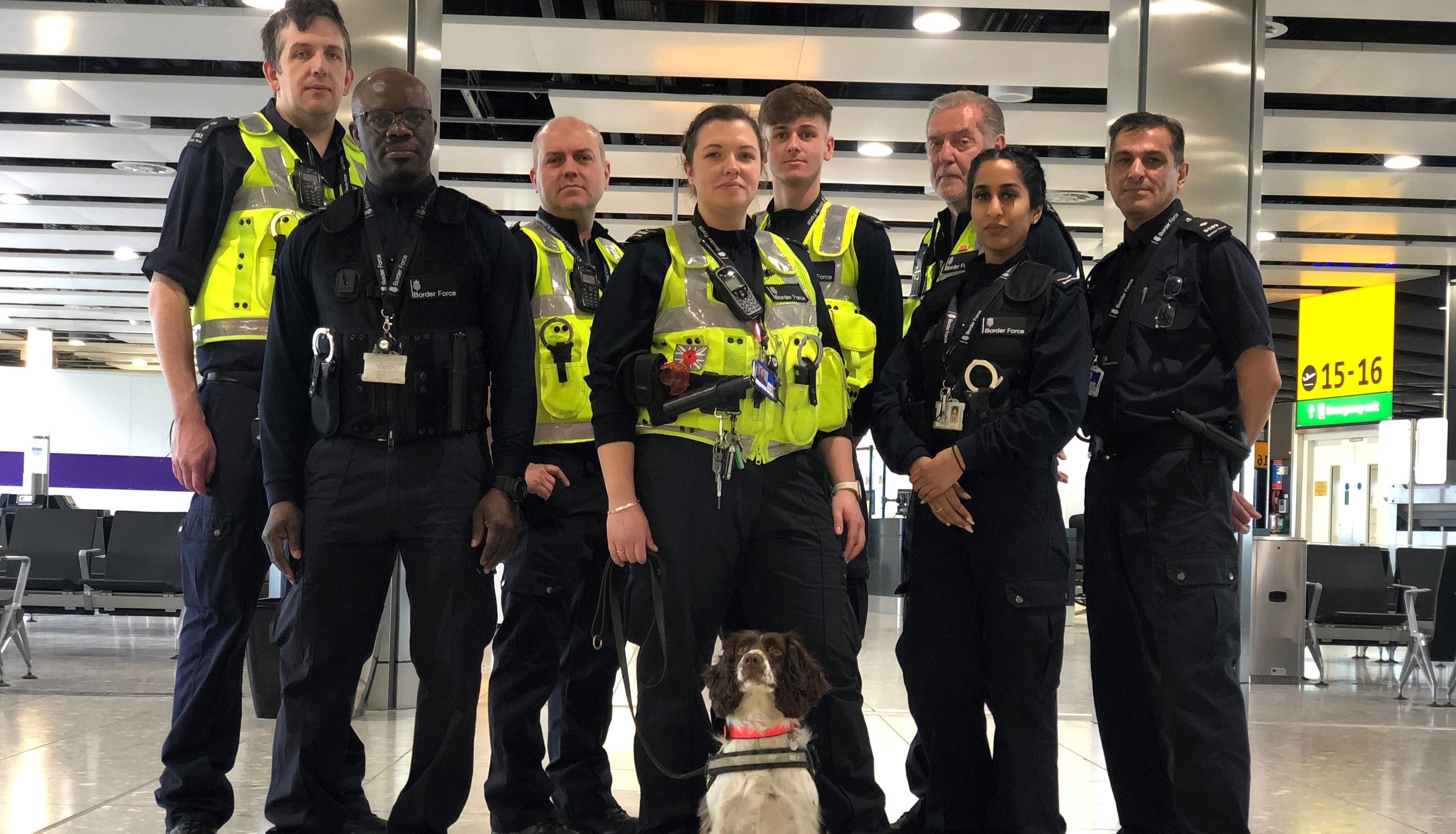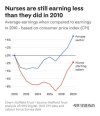BT and openreach both been on strike recentlyAre there any private sector companies striking?...no, they can’t hold a gun at the private sectors collective head!
Are we all in this ‘belt tightening together? Are we fuck!
where does the money come from to pay an extra 17-20%?
Mass delusion on a grand scale.
You are using an out of date browser. It may not display this or other websites correctly.
You should upgrade or use an alternative browser.
You should upgrade or use an alternative browser.
Discontent that will end the Tory Govt is coming
- Thread starter bluethrunthru
- Start date
Mazzarelli's Swiss Cheese
Well-Known Member
- Joined
- 12 Apr 2019
- Messages
- 20,379
- Team supported
- FC Zurich (and city of course)
Of course there isn't. The private sector has been de-unionised so it is more lean and 'competetive'. It's only the public sector and their collective action that acts as a check on private sector employees having Dickensian pay and conditions.Are there any private sector companies striking?...no, they can’t hold a gun at the private sectors collective head!
Are we all in this ‘belt tightening together? Are we fuck!
where does the money come from to pay an extra 17-20%?
Mass delusion on a grand scale.
denislawsbackheel
Well-Known Member
- Joined
- 28 May 2008
- Messages
- 27,382
- Team supported
- We went to Rotherham…
I suspect you’d be better off talking to my dog than that poster.Yes. Polyfloor who are just down the road from me for starters. Out for months but finally settled for 9% plus two 'bonus' payments of £600 plus.
The narrative that this is all the 'greedy' public sector versus the 'virtuous' private sector is just that, a narrative, put out by the RW media, and it is bollocks. What they don't mention is that the public sector is now very much smaller than it was. The Post Office, for example, is in the private sector, and on strike. They also don't mention that what's left of the public sector has had its wages practically frozen for ten years. That is the root of the problem.
bluethrunthru
Well-Known Member
They have broken everything


 www.thesun.co.uk
www.thesun.co.uk

 fl360aero.com
fl360aero.com

GMB union rejects improved NHS pay deal
The union represents the majority of ambulance staff working for the NHS in Scotland.
www.bbc.co.uk

Heathrow warning as staff to strike - find out if your flight is affected
BRITS flying from Heathrow over the next few days could face delays or cancellations due to baggage handlers going on strike. Ground staff will walk out at 4am tomorrow (December 16) for 72 hours a…

Border Force staff are going on strike for eight days over Christmas at Heathrow , Gatwick and several other airports , 10000 flights to get affected !
Over the Christmas , border force in the United Kingdom will go on strike, posing a serious threat to travellers at airports, that can affect an excess of 10000 flights during the period. In a holiday-related strike, members of the Public and Commercial Services union join highway workers and...
law74
Well-Known Member
Are there any private sector companies striking?...no, they can’t hold a gun at the private sectors collective head!
Are we all in this ‘belt tightening together? Are we fuck!
where does the money come from to pay an extra 17-20%?
Mass delusion on a grand scale.
With Royal Mail having been sold off at half the market value by the self-servatives, rail companies likewise and many other privatised companies on strike, you appear totally brainwashed.Are there any private sector companies striking?...no, they can’t hold a gun at the private sectors collective head!
Are we all in this ‘belt tightening together? Are we fuck!
where does the money come from to pay an extra 17-20%?
Mass delusion on a grand scale.
Add to that, I, and many other public sector workers am £5,000 per annum worse off than I was 12 years ago due to tories making workers pay for the bankers recklessness (at least Iceland done the honourable thing and jailed those responsible in their country).
That is almost £100 a week from ONE PERSON that is no longer being spent in the local butcher's, chippy, pub, restaurant etc.
With quite a few others in a similar position one of the two pubs in my village has closed, meaning 20 people have lost their jobs, and the chancellor has lost that tax revenue and the benefits bill has gone up.
The other pub is now only open Thursday, Friday evenings and a Saturday.
The chipp had to close, though it has recently reopened but with reduced hours and staff.
Cutting workers wages doesn't "grow" the economy, it shrinks it.
Removing the cap on bankers bonuses will boost the sales of sports cars, yachts and sales of champagne, but it will do nothing for the ordinary man and woman.
12 years of the Tories has been a disaster, especially following on from another 30 years of neo-liberal capitalist policy.
Glad you admit it.Are there any private sector companies striking?...no, they can’t hold a gun at the private sectors collective head!
Are we all in this ‘belt tightening together? Are we fuck!
where does the money come from to pay an extra 17-20%?
Mass delusion on a grand scale.
The private sector by and large hasn't needed strikes to get pay rises higher than the public sector. Employers have to pay more to recruit and retain staff. In the public sector the government just doesn't care about staff shortages caused by low wages (and lies about the numbers).
On the railways, privatisation brought little competition for the passengers but it did bring competition for staff (driver pay shot up) and train companies settled separately with the unions. The Financial Times explains:
"In the pre-Covid era, the train operators were able to negotiate with the unions on an individual basis rather than collectively, making accommodations easier to come by. That changed when the pandemic ended the franchising model and the train companies became fee-driven operators bearing none of the revenue risk, with the taxpayer taking it on instead. And with the government standing behind the budget, it inevitably ends up setting the terms of the pay package. That leaves employers — bunched together as the Rail Delivery Group — stuck trying to agree tricky nationwide reforms such as driver-only operated trains that, while acceptable on some parts of the network, are a red rag to the RMT union on others."

Why private sector strikes are not all about the money
Disputes at Royal Mail and the railways will not be solved with pay rises alone
 www.ft.com
www.ft.com
threespires
Well-Known Member
- Joined
- 7 Aug 2019
- Messages
- 8,653
- Team supported
- City
Maybe so but it's a bit like Joey Essex calling someone dumb.
That made me simultaneously laugh and cry at how far we've sunk.
Blue and true
Well-Known Member
- Joined
- 13 Feb 2015
- Messages
- 4,465
These lot surely don't survive another GE. I don't mind living in the UK, despite there being many things I detest about it. But if our gullible populace hand this shower the keys to another mandate, I'll have to leave.
Enough is enough. How many more ruptures in the system need to be seen before people wise up?
Enough is enough. How many more ruptures in the system need to be seen before people wise up?
bluethrunthru
Well-Known Member
Sunak gone by Spring?
Working for the Prison service public sector I totally agree. I’m worse off now than others who do a similar job in the private sector.With Royal Mail having been sold off at half the market value by the self-servatives, rail companies likewise and many other privatised companies on strike, you appear totally brainwashed.
Add to that, I, and many other public sector workers am £5,000 per annum worse off than I was 12 years ago due to tories making workers pay for the bankers recklessness (at least Iceland done the honourable thing and jailed those responsible in their country).
That is almost £100 a week from ONE PERSON that is no longer being spent in the local butcher's, chippy, pub, restaurant etc.
With quite a few others in a similar position one of the two pubs in my village has closed, meaning 20 people have lost their jobs, and the chancellor has lost that tax revenue and the benefits bill has gone up.
The other pub is now only open Thursday, Friday evenings and a Saturday.
The chipp had to close, though it has recently reopened but with reduced hours and staff.
Cutting workers wages doesn't "grow" the economy, it shrinks it.
Removing the cap on bankers bonuses will boost the sales of sports cars, yachts and sales of champagne, but it will do nothing for the ordinary man and woman.
12 years of the Tories has been a disaster, especially following on from another 30 years of neo-liberal capitalist policy.
Not had a pay rise under the Tory government, even though the pay review body, which is our only bargaining tool, has recommended a pay rise every year.
The service is on its knees due to government cuts, and it is illegal for us to take any strike action. The only way for us to show any dissent is for us to retreat to safe areas( like the gate area of the prison), when it is unsafe for us and prisoners,due to staffing cuts. We are then ordered back into the prisons by the high courts.
Our ability to take industrial action was removed by the government whilst being reviewed under European law.
I and many others now live under the constant threat of extended shifts and being ordered to work on our rest days and our annual leave being cancelled, whilst not being paid any overtime.
Last edited:
Blue Boy 63
Well-Known Member
- Joined
- 11 Aug 2020
- Messages
- 317
- Team supported
- Manchester City
BeerIsTheBest
Well-Known Member
- Joined
- 6 Oct 2018
- Messages
- 2,156
VicGlad you admit it.
The private sector by and large hasn't needed strikes to get pay rises higher than the public sector. Employers have to pay more to recruit and retain staff. In the public sector the government just doesn't care about staff shortages caused by low wages (and lies about the numbers).
On the railways, privatisation brought little competition for the passengers but it did bring competition for staff (driver pay shot up) and train companies settled separately with the unions. The Financial Times explains:
"In the pre-Covid era, the train operators were able to negotiate with the unions on an individual basis rather than collectively, making accommodations easier to come by. That changed when the pandemic ended the franchising model and the train companies became fee-driven operators bearing none of the revenue risk, with the taxpayer taking it on instead. And with the government standing behind the budget, it inevitably ends up setting the terms of the pay package. That leaves employers — bunched together as the Rail Delivery Group — stuck trying to agree tricky nationwide reforms such as driver-only operated trains that, while acceptable on some parts of the network, are a red rag to the RMT union on others."

Why private sector strikes are not all about the money
Disputes at Royal Mail and the railways will not be solved with pay rises alonewww.ft.com
Thanks for sharing the FT piece. I have experienced businesses (Printing and roadside vehicle rescue) where a defined group of employees have, over time garnered the most attractive T&Cs and normally enjoy higher annual wage rises or incentives or improvements due to their importance to the organisation.
in footie terms I suppose it’s a bit like KDB earring more than other, more mortal players. Imagine the cost implications of having to give every player on our staff the same percentage increase as Kev?
Trying to appease all working groups in a organisation with highly skilled, highly valued employees and others with less skills during a period of rampant inflation is tricky at the best of times. You’ve got to go back quite a few years when this challenge really existed.
Maybe unsurprising that the gvmt didnt think this through when awarding contracts. I bet nobody senior now in gvmt has directly negotiated with unions in a high inflation time or thought that the nuances of pay budget was deeper than just a vanilla increase across all employees, irrespective of job role. More likely nobody was really bothered about doing thoughtful budgeting homework.
Personally I like to think that Sunak will capitulate on nurses. Don’t know what they can do with organisations like rail where they have dug a really deep hole.
BringBackSwales
Well-Known Member
- Joined
- 3 Jul 2009
- Messages
- 37,195
What a lot of people don’t take account of is the enormous difference between public and private sector pensions. The majority of private sector companies stopped Defined Benefit employers closed their DB schemes to new employees decades ago, and most now don’t even use them for employees who were previously in them, and have replaced them with massively less beneficial Defined Contribution schemes. The public sector still use Defined Benefit scheme, and these produce hugely better pensions per pound if payroll. In private companies any deficit on scheme future payments versus scheme assets goes onto the company’s balance sheet. In the public sector this isn’t counted on the Government’s debt; I attended a pension seminar 20 years ago and the hidden public sector debt was said to be over 2 TRILLION pounds, it is now closer to 3 TRILLION pounds and increases every year - this is real debt but not counted as debt, and is actually a bigger value than the whole of the country’s officially published debt. Three things come to mind from this (1) it is a real but rarely acknowledged differential of public v private sector pay (2) it means the country is more ducked than we think it is (3) it’s political suicide for any government that tries to do anything about it.
The Light Was Yellow Sir
Well-Known Member
law74
Well-Known Member
Maybe you should attend another seminar soon because public sector pensions, which were ALWAYS sold as deferred pay, have changed massively in the last ten years (see the McCloud judgement), with pensionable age rising for females from 60 to 67 or depending on age 68, and pension changing from final salary to average earnings, at the same time as wages have been cut year on year, up to 20% in real terms.What a lot of people don’t take account of is the enormous difference between public and private sector pensions. The majority of private sector companies stopped Defined Benefit employers closed their DB schemes to new employees decades ago, and most now don’t even use them for employees who were previously in them, and have replaced them with massively less beneficial Defined Contribution schemes. The public sector still use Defined Benefit scheme, and these produce hugely better pensions per pound if payroll. In private companies any deficit on scheme future payments versus scheme assets goes onto the company’s balance sheet. In the public sector this isn’t counted on the Government’s debt; I attended a pension seminar 20 years ago and the hidden public sector debt was said to be over 2 TRILLION pounds, it is now closer to 3 TRILLION pounds and increases every year - this is real debt but not counted as debt, and is actually a bigger value than the whole of the country’s officially published debt. Three things come to mind from this (1) it is a real but rarely acknowledged differential of public v private sector pay (2) it means the country is more ducked than we think it is (3) it’s political suicide for any government that tries to do anything about it.
This struggle is NOT about public sector V's Private Sector, it is workers against the landed gentry and the obscenely wealthy that want to deprive us of even the crumbs from their table.
At a time when the average earnings of CEO's in the FTSEtop 100 has risen by 39% in the
Last 12 months, while workers wages have dropped at a faster rate since the industrial revolution, it is time for change.
BringBackSwales
Well-Known Member
- Joined
- 3 Jul 2009
- Messages
- 37,195
The point about 20 years ago was the deficit in public sector pension schemes, which is resl but not included in any figures for national debt. It was two trillion pounds, it is now closer to three trillion. It’s getting bigger and it has to be paid for. Nobody can afford to pay for that, even the cunting richMaybe you should attend another seminar soon because public sector pensions, which were ALWAYS sold as deferred pay, have changed massively in the last ten years (see the McCloud judgement), with pensionable age rising for females from 60 to 67 or depending on age 68, and pension changing from final salary to average earnings, at the same time as wages have been cut year on year, up to 20% in real terms.
This struggle is NOT about public sector V's Private Sector, it is workers against the landed gentry and the obscenely wealthy that want to deprive us of even the crumbs from their table.
At a time when the average earnings of CEO's in the FTSEtop 100 has risen by 39% in the
Last 12 months, while workers wages have dropped at a faster rate since the industrial revolution, it is time for change.
From rail to farmers via nurses, the message is the same. The Tories aren't listening. Staff shortages in so many area because wages are better elsewhere or they just can't get the staff. (Latest is 45,000 visas for seasonal farm workers, NFU reckoned 55,000 needed - and coming from places like Nepal and possibly taking on debt to get here so effective modern slavery, rather than the regular EU returnees who know what they're doing without fresh training.) The cost of agency workers, reliance on rest day working, and in the case of rail a terrible service so fewer passengers travel and more subsidy needed unless services are cut further.Vic
Thanks for sharing the FT piece. I have experienced businesses (Printing and roadside vehicle rescue) where a defined group of employees have, over time garnered the most attractive T&Cs and normally enjoy higher annual wage rises or incentives or improvements due to their importance to the organisation.
in footie terms I suppose it’s a bit like KDB earring more than other, more mortal players. Imagine the cost implications of having to give every player on our staff the same percentage increase as Kev?
Trying to appease all working groups in a organisation with highly skilled, highly valued employees and others with less skills during a period of rampant inflation is tricky at the best of times. You’ve got to go back quite a few years when this challenge really existed.
Maybe unsurprising that the gvmt didnt think this through when awarding contracts. I bet nobody senior now in gvmt has directly negotiated with unions in a high inflation time or thought that the nuances of pay budget was deeper than just a vanilla increase across all employees, irrespective of job role. More likely nobody was really bothered about doing thoughtful budgeting homework.
Personally I like to think that Sunak will capitulate on nurses. Don’t know what they can do with organisations like rail where they have dug a really deep hole.
gordondaviesmoustache
Well-Known Member
You should put all that on the side of a bus…From rail to farmers via nurses, the message is the same. The Tories aren't listening. Staff shortages in so many area because wages are better elsewhere or they just can't get the staff. (Latest is 45,000 visas for seasonal farm workers, NFU reckoned 55,000 needed - and coming from places like Nepal and possibly taking on debt to get here so effective modern slavery, rather than the regular EU returnees who know what they're doing without fresh training.) The cost of agency workers, reliance on rest day working, and in the case of rail a terrible service so fewer passengers travel and more subsidy needed unless services are cut further.
G
G
ganganvince
Guest
Royal Mail, BT just gone back in. Greene King, InBev, Amazon voted to go out of top of my headAre there any private sector companies striking?...no, they can’t hold a gun at the private sectors collective head!
Are we all in this ‘belt tightening together? Are we fuck!
where does the money come from to pay an extra 17-20%?
Mass delusion on a grand scale.
bluethrunthru
Well-Known Member
Its also worth noting that in a widely reported poll 1 in 10 of 18 - 24 year olds thats a quarter of a million youngsters say they are never going to look for work. They will live at home - do the odd side hustle to get a bit of spending money and thats it.
Why would they do that you ask?
Because they know that basically they are in a society where education and work doesn't pay for every one. You get a degree and end up flipping burgers - you get a "good" job like a nurse or a social worker - they see strikes and how unrewarding that work is. They will never be able to own their own home - its hardly likely they will be able to rent and enjoy any sort of social life - they don't want to clean stations or streets so they are just opting out.
Why would they do that you ask?
Because they know that basically they are in a society where education and work doesn't pay for every one. You get a degree and end up flipping burgers - you get a "good" job like a nurse or a social worker - they see strikes and how unrewarding that work is. They will never be able to own their own home - its hardly likely they will be able to rent and enjoy any sort of social life - they don't want to clean stations or streets so they are just opting out.

